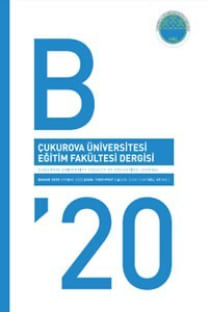Teaching Vocabulary to Visually Impaired EFL Learners: A Small-Scale Study
English, vocabulary teaching, visually impaired
___
Anthony, G., & Walshaw, M. (2009). Effective pedagogy in mathematics. 1st ed.[ebook], Geneva, Switzerland: International Academy of Education.Atay, D. & Kurt, G. (2006). Elementary school EFL learners’ vocabulary learning: the effects of post reading activities. The Canadian Modern Language Review, 63(2), 255-273.
Bagheri, V. (2015). The impact of visual and verbal techniques on vocabulary achievement of Iranian high school students. Advances in Asian Social Science, 6(4), 1071-1084.
Barani, G., Mazandarani, O. & Seyyad-Rezaie, S. H. (2010). The effect of application of picture into picture audio-visual aids on vocabulary learning of Iranian ELF learners. Procedia, 2, 5362-5369. Doi:10.1016/j.sbspro.2010.03.874
Basaran, S. (2012). Teaching English to visually impaired students in Turkey: a case study. Energy, Education, Science and Technology Part B: Social and Educational Studies, 2, 217-226.
Boguslaw, M. (2000). Learning from experience: mobility and daily living skills in an English language classroom. Retrieved from: http://www.icevieurope.org/cracow2000/proceedings/chapter05/05-08.doc
Carter, R. & McCarthy, M. (2013). Vocabulary and Language Teaching, London: Routledge.
Chou, M. (2014). Assessing English vocabulary and enhancing young English as a Foreign Language (EFL) learners’ motivation through games, songs and stories. Education 3-13 (42/3), 284-297. Doi:10.1080/03004279.2012.680899
Creswell, J. W. (2007). Qualitative Inquiry and Research Design, Thousand Oaks: Sage.
Demircioglu. S. (2010). Teaching English vocabulary to young learners via drama. Procedia, 2, 439-443. Doi: 10.1016/j.sbspro.2010.03.039
Fraenkel, J. R., Wallen, N. E. & Hyun, H. H. (2012). How To Design And Evaluate Research in Education. New York Mc: Graw-Hill.
Grabe, W. (2009). Reading in A Second Language: Moving From Theory to Practice. Cambridge: NY.
Hammersley, M. & Atkinson, P. (1995). Ethnography: Principles in Practice, London: Routledge.
Julkunen, K. (2001). Situation-and task-specific motivation in foreign language learning. In Dörnyei, Z. & Schmidt, R. (Eds.). Motivation and Second Language Acquisition. (pp. 29-41). Honolulu: University of Hawai’I Press.
Kocyigit, N. & Sabuncu-Artar, P. (2015). A challenge: teaching English to visually impaired learners. Procedia, 199, 689-694. Doi: 10.1016/j.sbspro.2015.07.599
Köseler, H. (2012). Görme engelliler için fen bilgisi ve matematik eğitimi [Science and mathematics for visually impaired]. Retrieved from : http://www.halilkoseler.com
Maguvhe, M. (2015). Teaching science and mathematics to students with visual impairments: Reflections of a visually impaired technician. African Journal of Disability, 4 (1), Art. #194, 6 pages. Doi:10.4102/ajod.v4i1.194
Mulloy, A. M., Gevarter, C., Hopkins, M., Sutherland, K. S. & Ramdoss, S. T. (2014). Assistive technology for students with visual impairments and blindness. In: Lancioni,G. E. & Singh, N. N. (eds.), Assistive Technologies for People With Diverse Abilities,113-156. Doi:10.1007/978-1-4899-8029-8_5
Ojeda, F. A. (2004). The role of word games in second-language acquisition: second language pedagogy, motivation and lucid tasks. Unpublished MA thesis, University of Florida, USA. Retrieved from: http://etd.fcla.edu/UF/UFE0003980/ojeda_f.pdf
Papathasiou, E. (2009). An investigation of two ways of presenting vocabulary. ELT Journal, 63 (4), 313-322.
Phillips, S. (1993). Young Learners. Oxford: Oxford
Quek, F., & McNeill, D. (2006). Embodiment awareness, mathematics discourse, and the blind. Annals of the New York Academy of Sciences, 1093, 266–279.
Sakiz, H., & Woods, C. (2005). Achieving inclusion of students with disabilities in Turkey: current challenges and futureprospects. International Journal of Inclusive Education, 19(1), 21-35.
Siligo, W. R. (2005). Enriching the ensemble experience for students with visual impairments. Music Educators Journal, 91 (5), 31-36.
Sonbul, S. & Schmitt, N. (2009). Direct teaching of vocabulary after reading: is it worth the effort?. ELT Journal, 64 (3), 253-260. Doi:10.1093/elt/ccp059
Stein, V., Nesselrath, R., Alexandersson, J. & Tröger, J. (2011). Designing with and for the visually impaired: vocabulary, spelling and the screen reader. CSEDU(2). Retrieved from: http://avos.sb.dfki.de/sites/default/files/results_paper.pdf
Sun,Y. & Dong, Q. (2014). An experiment on supporting children’s English vocabulary learning in multimedia context. Computer Assisted Language Learning, 17/2, 131-147. Doi:10.1080/0958822042000334217
Topor, I. & Rosenblum, L. P. (2013).English language learners: Experiences of teachers of students with visual impairments who work with this population. Journal of Visual Impairment & Blindness, 107 (2),79-91.
Tuncer, A. T. & Altunay, B. (2006). The effect of summarization-based cumulative retelling strategy on listening comprehension of college students with visual impairments. Journal of Visual Impairment & Blindness, 100 (6), 353-365
Yen, Lin; Chen, Chih-Ming; Huang, Hong-Bin. (June 2-3, 2016). Effects of mobile game-based English vocabulary learning APP on learners' perceptions and learning performance: A case study of Taiwanese EFL learners. In Idrus, R. M. & Zainuddin, N. (Eds.) Proceedings of the 11th International Conference on e-Learning, Kuala Lumpur, Malaysia.
- ISSN: 1302-9967
- Yayın Aralığı: Yılda 3 Sayı
- Başlangıç: 2000
- Yayıncı: Çukurova Üniversitesi Matbaası
Comparison of Classification Judgments Scaling Methods
A Review on Cross Cultural Education throughout Europe: Identity Issues
History of Mathematics in the Turkish Middle School Mathematics Curriculum and Textbooks
Gülçin TAN ŞİŞMAN, Büşra KİREZ
Online Self-regulation Questionnaire: Validity and Reliability Study of Turkish Translation
Türkiye’deki Üniversite Öğrencileri Arasında Yalnızlığın Yordayıcıları: Utangaçlık ve Cinsiyet
Mine MUYAN YILIK, Gökçe Sancak AYDIN, Ayhan DEMİR
Sümeyra TOPAL, Sinem YALNIZOĞLU ÇAKA, Nursan ÇINAR
Öğretmenlerin Mesleki Gelişiminde Lisansüstü Eğitim: Eğitim Programları ve Öğretim Doktora Programı
Güncel Eğitim Teknolojilerinin Fen Eğitiminde Kullanılması: Tarama Çalışması
Fatih Saltan, Tuğçe Türkyılmaz, Caner Karaçaltı, Kemal Bilir
Örgütsel Adalet, İş Motivasyonu ve Öğretmen Performansı Arasındaki İlişkilerin İncelenmesi
